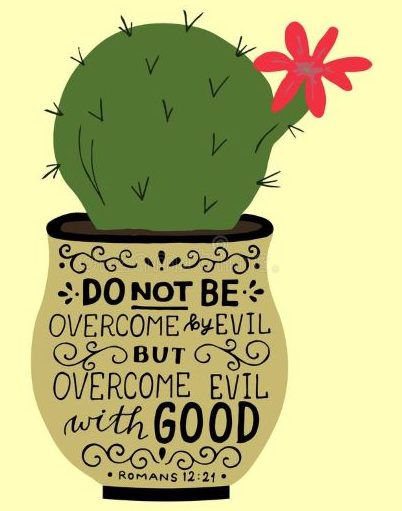Life’s difficulties, as many have experienced, arise from various possible angles. Sometimes we cause our own difficulties through poor decisions. However, trials also come through other people. Not necessarily from something we did to deserve it. But, wham! We get hit hard because of what somebody else does to us, often because their way of life is in opposition to ours. It becomes a tangled web, a path of carnage. People get caught in the middle and have profound effects on others around them. There are just some situations that we cannot remove ourselves from.
It’s been said that tests and trials develop character. Most have learned that we cannot change another person. Hence, the best solution out of the carnage will actually be to transform ourselves, our thoughts, feelings and responses. However, in an ongoing barrage of unsolicited advice and direct confrontation we often prefer the other person develops character, and at our hands! While some want to include God in the solutions, it’s more likely, they cry out to God about the other person. “God, take that away from me!” or, “Fix that person, because he’s really in a mess.” However, we may be guilty of causing more offenses to others than others have done to us.
So, we need solutions that work. We can begin to see the answer by reading a simple, yet profound, instruction from the Apostle Paul: “Be not overcome by evil, but overcome evil with good” (Romans 12:21).
Christ did not overcome evil with persuasive words. He didn’t talk people out of lawlessness. He didn’t persuade people to change, overall. He gave His disciples a clear set of instructions about how to respond to those who made life miserable for them: “But I say unto you, Love your enemies, bless them that curse you, do good to them that hate you, and pray for them which despitefully use you, and persecute you;” (Matthew 5:44). If we let another person govern our emotions so that we become angry, or miserable, or depressed, that is being overcome by evil. He is saying that we don’t have to be overcome in that way. He’s addressing the whole “victim mentality” of our day: People who consider themselves a victim of the negative actions of others and behave as if this were the case in the face of contrary evidence of such circumstances.
We should not let another person’s evil provoke evil thoughts or attitudes or deeds in us. We don’t have to give them that kind of power. If someone does evil to us, even if it grows into a difficult or long trial, we should say to ourselves, “I will not be controlled by you. I will not have my attitudes, thoughts, and actions dictated by your evil.” If we react to another person who offends us, and become bitter towards them, we’re putting ourselves in an emotional prison. Bitterness will control our thoughts, our emotions, our free time, and our health. To be freed from that prison, we must have a forgiving mindset.
This is so different from the way that most people react. We just naturally let our emotions, thoughts, and actions become automatic, like reflexes, to what people say or do to us. Then we turn and blame them for our wrong responses, our anger, our bitterness, our resentment, discouragement, depression. We become “held captive” by our own thinking and emotions. If we conqueror ourselves, we free ourselves from negative debilitating emotions, and overcome evil with good.
The Apostle Peter instructs: “Finally, all of you, have unity of mind, sympathy, brotherly love, a tender heart, and a humble mind. Do not repay evil for evil or reviling for reviling, but on the contrary, bless, for to this you were called, that you may obtain a blessing. For ‘Whoever desires to love life and see good days, let him keep his tongue from evil and his lips from speaking deceit; let him turn away from evil and do good; let him seek peace and pursue it. For the eyes of the Lord are on the righteous, and his ears are open to their prayer. But the face of the Lord is against those who do evil'” (1 Peter 3:8-12 ESV).
When responding with grace and humility toward trials that come upon us through other people, we find strength which comes by producing godly character: ” Not only that, but we rejoice in our sufferings, knowing that suffering produces endurance, and endurance produces character, and character produces hope,” (Romans 5:3-4 ESV). James elaborates: “Count it all joy, my brothers, when you meet trials of various kinds, for you know that the testing of your faith produces steadfastness [patience or perseverance]. . . .Blessed is the man who remains steadfast under trial, for when he has stood the test he will receive the crown of life, which God has promised to those who love him” (James 1:2-3) (James 1:12 ESV).
God has assured us that He will not permit us to be attacked with trials and temptations that are too overwhelming for us to handle: “No temptation has overtaken you that is not common to man. God is faithful, and He will not let you be tempted beyond your ability, but with the temptation He will also provide the way of escape, that you may be able to endure it” (1 Corinthians 10:13 ESV).
In trials that come upon us by the evil words and deeds of others, or the invariable consequences that tend to spread far and wide, remember that we have done the same things. We can develop the character of Christ. He responded to tests and trials with examples of extreme love and goodness. Praying for Christ’s qualities and solutions will give us peace and strength in all our relationships and struggles.
Do not be overcome by evil. Overcome evil with good.
Tim Vail


